
Updated From Sight to Sound Modern Methods for Pulling Audio From Visual Media for 2024

From Sight to Sound: Modern Methods for Pulling Audio From Visual Media
Audio Extractor: How to Extract Audio from Video

Shanoon Cox
Mar 27, 2024• Proven solutions
You have a video that includes a great soundtrack that you’d like to extract it so that you can listen to it using the media player - a portable MP3 player, for instance. That can be a very easy job if you use the professional video editing software- Wondershare Filmora . Just follow this guide to extract audio from video with ease.
If you didn’t have Filmora yet, click the download button below to get started.
 Download Mac Version ](https://tools.techidaily.com/wondershare/filmora/download/ )
Download Mac Version ](https://tools.techidaily.com/wondershare/filmora/download/ )
1. Import video files
Install and run this Wondershare Filmora. Then click the “Import” button to locate and add your target video. You can also directly drag and drop the video to the program. The loaded video will be listed in the media library as the following picture shows.
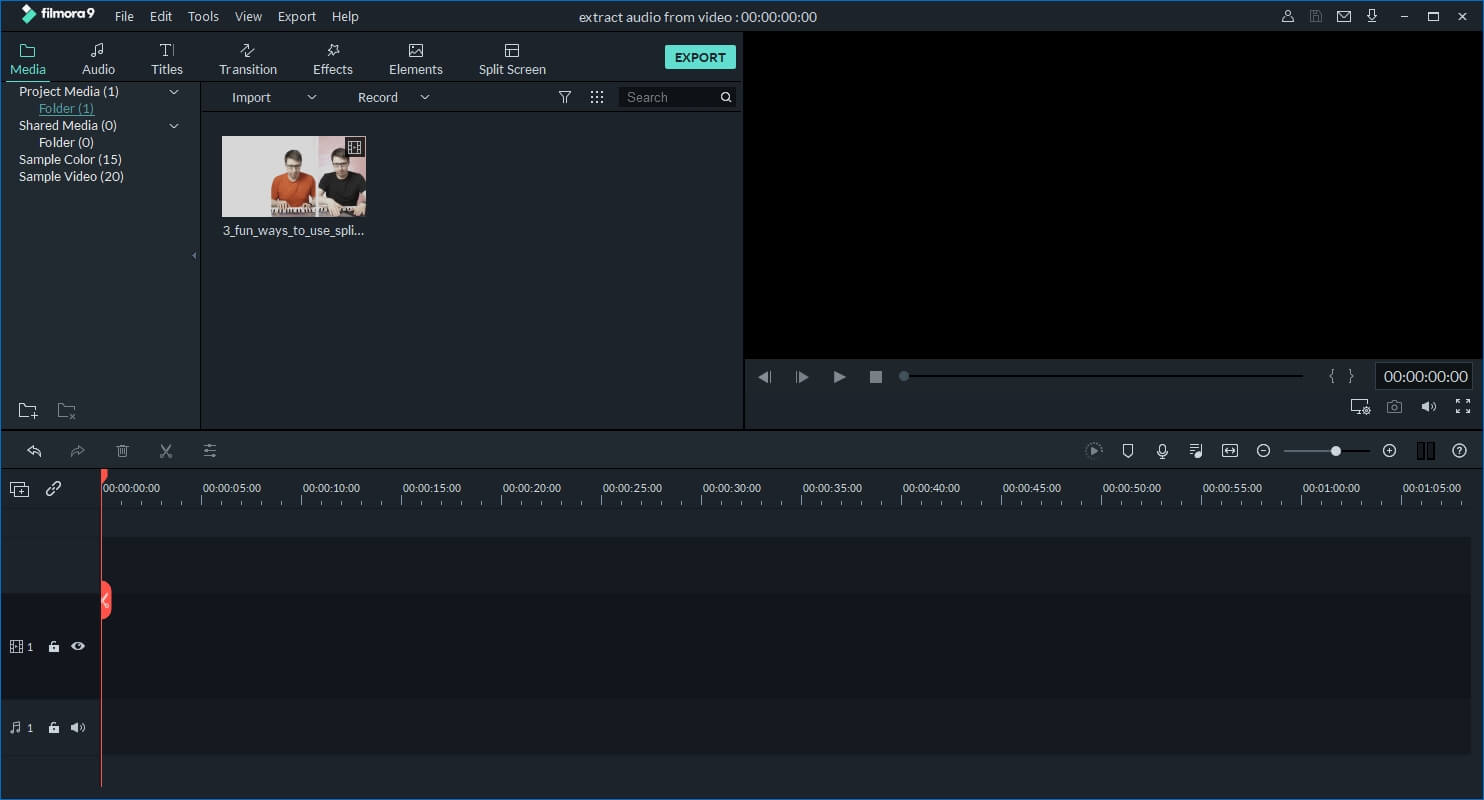
2. Start extracting audio from video
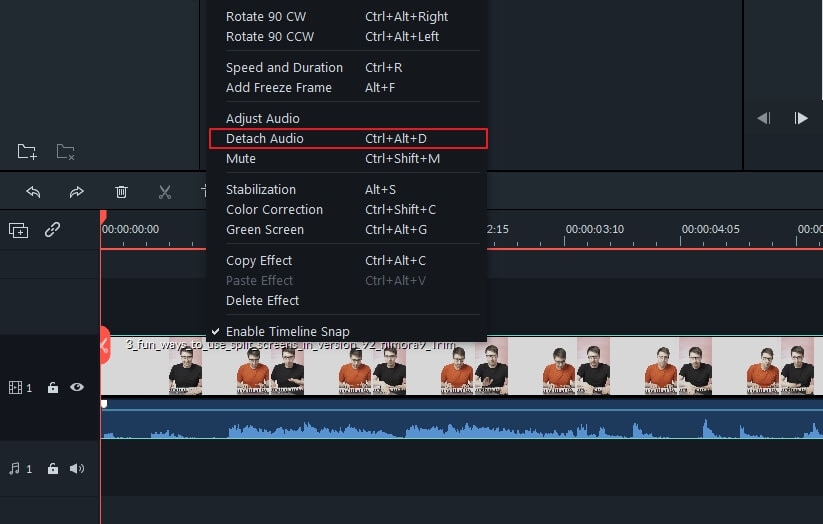
After importing video to Wondershare Filmora, drag the video from the media library to the video Timeline. You can then right-click the video clip and choose “Audio Detach” to extract audio from the video. After a while, video and audio will be displayed on different tracks. If you don’t want to keep the video file, right-click it and choose “Delete” to remove it from the video timeline.
3. Edit the extracted audio if you like
Double click the extracted file in the audio track and then you will see the audio editing panel.
You can add fade-in and fade-out effects, change the sound volume , adjust the pitch to change the voice , etc. as you like.
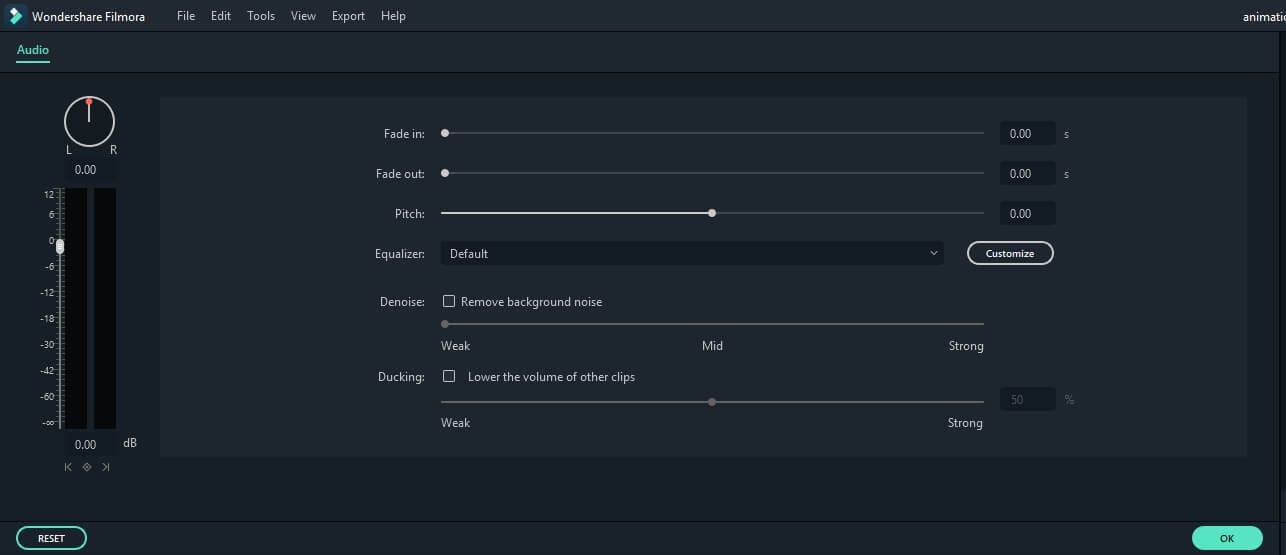
If you find some unnecessary sounds in the extracted audio file, and you want to delete them, just put the cursor to the place where you would like the deletion to start and press the “Split” button to split. The end of the deletion area can be marked similarly – play the audio and select the final point of the area to be excluded from the output audio, and then press the “Split” button again.
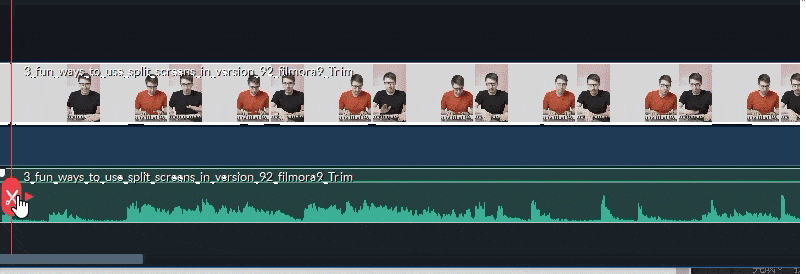
Click the split part in the audio track, press the Delete button on the keyboard, or click the Delete icon on the toolbar to remove the unwanted audio clip.
4. Save the edited audio file
After that, click the “Export” button to export the extracted audio track. Here different options are provided. For example, you can save the audio in regular formats such as MP3, MP4, WMV, AVI, and so on in the “Device” tab.
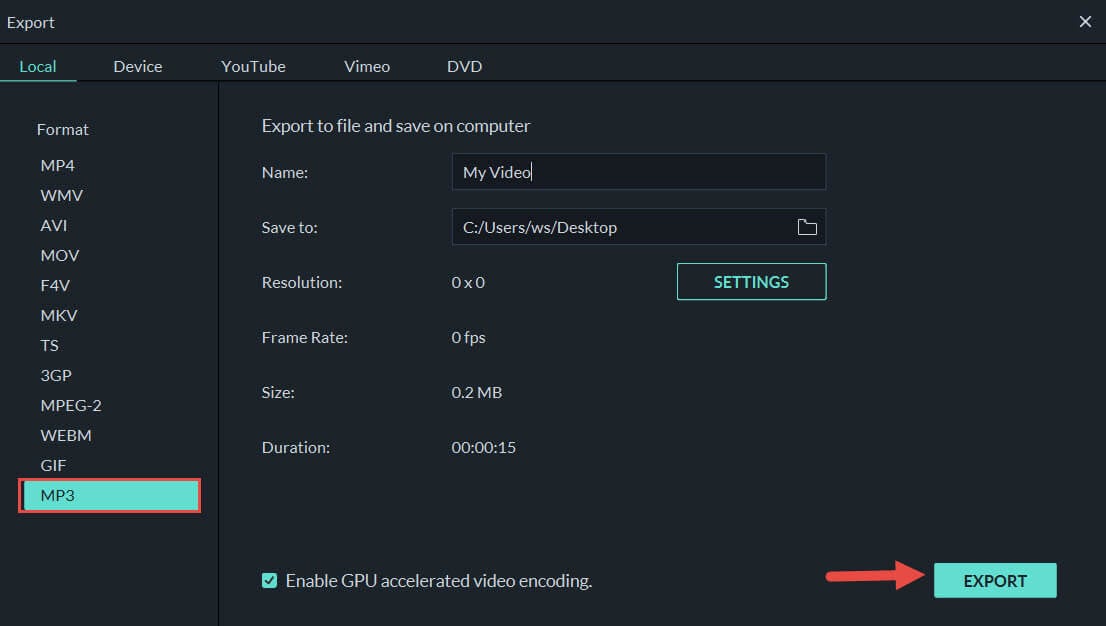
To customize the audio Encoder, Sample Rate, Bit Rate or Channel settings, click the SETTINGS button to start.
Besides that, you can export the audio file for playback on portable devices, burn it to DVD or share it to YouTube directly.
Select a desirable output method and then click the “Export” button to save the audio track.
Tips: Filmora supports a wide range of audio and video formats. You can easily extract mp3 from mp4 video, or extract the audio from video and then save it in .wav format.

Shanoon Cox
Shanoon Cox is a writer and a lover of all things video.
Follow @Shanoon Cox
Shanoon Cox
Mar 27, 2024• Proven solutions
You have a video that includes a great soundtrack that you’d like to extract it so that you can listen to it using the media player - a portable MP3 player, for instance. That can be a very easy job if you use the professional video editing software- Wondershare Filmora . Just follow this guide to extract audio from video with ease.
If you didn’t have Filmora yet, click the download button below to get started.
 Download Mac Version ](https://tools.techidaily.com/wondershare/filmora/download/ )
Download Mac Version ](https://tools.techidaily.com/wondershare/filmora/download/ )
1. Import video files
Install and run this Wondershare Filmora. Then click the “Import” button to locate and add your target video. You can also directly drag and drop the video to the program. The loaded video will be listed in the media library as the following picture shows.

2. Start extracting audio from video

After importing video to Wondershare Filmora, drag the video from the media library to the video Timeline. You can then right-click the video clip and choose “Audio Detach” to extract audio from the video. After a while, video and audio will be displayed on different tracks. If you don’t want to keep the video file, right-click it and choose “Delete” to remove it from the video timeline.
3. Edit the extracted audio if you like
Double click the extracted file in the audio track and then you will see the audio editing panel.
You can add fade-in and fade-out effects, change the sound volume , adjust the pitch to change the voice , etc. as you like.

If you find some unnecessary sounds in the extracted audio file, and you want to delete them, just put the cursor to the place where you would like the deletion to start and press the “Split” button to split. The end of the deletion area can be marked similarly – play the audio and select the final point of the area to be excluded from the output audio, and then press the “Split” button again.

Click the split part in the audio track, press the Delete button on the keyboard, or click the Delete icon on the toolbar to remove the unwanted audio clip.
4. Save the edited audio file
After that, click the “Export” button to export the extracted audio track. Here different options are provided. For example, you can save the audio in regular formats such as MP3, MP4, WMV, AVI, and so on in the “Device” tab.

To customize the audio Encoder, Sample Rate, Bit Rate or Channel settings, click the SETTINGS button to start.
Besides that, you can export the audio file for playback on portable devices, burn it to DVD or share it to YouTube directly.
Select a desirable output method and then click the “Export” button to save the audio track.
Tips: Filmora supports a wide range of audio and video formats. You can easily extract mp3 from mp4 video, or extract the audio from video and then save it in .wav format.

Shanoon Cox
Shanoon Cox is a writer and a lover of all things video.
Follow @Shanoon Cox
Shanoon Cox
Mar 27, 2024• Proven solutions
You have a video that includes a great soundtrack that you’d like to extract it so that you can listen to it using the media player - a portable MP3 player, for instance. That can be a very easy job if you use the professional video editing software- Wondershare Filmora . Just follow this guide to extract audio from video with ease.
If you didn’t have Filmora yet, click the download button below to get started.
 Download Mac Version ](https://tools.techidaily.com/wondershare/filmora/download/ )
Download Mac Version ](https://tools.techidaily.com/wondershare/filmora/download/ )
1. Import video files
Install and run this Wondershare Filmora. Then click the “Import” button to locate and add your target video. You can also directly drag and drop the video to the program. The loaded video will be listed in the media library as the following picture shows.

2. Start extracting audio from video

After importing video to Wondershare Filmora, drag the video from the media library to the video Timeline. You can then right-click the video clip and choose “Audio Detach” to extract audio from the video. After a while, video and audio will be displayed on different tracks. If you don’t want to keep the video file, right-click it and choose “Delete” to remove it from the video timeline.
3. Edit the extracted audio if you like
Double click the extracted file in the audio track and then you will see the audio editing panel.
You can add fade-in and fade-out effects, change the sound volume , adjust the pitch to change the voice , etc. as you like.

If you find some unnecessary sounds in the extracted audio file, and you want to delete them, just put the cursor to the place where you would like the deletion to start and press the “Split” button to split. The end of the deletion area can be marked similarly – play the audio and select the final point of the area to be excluded from the output audio, and then press the “Split” button again.

Click the split part in the audio track, press the Delete button on the keyboard, or click the Delete icon on the toolbar to remove the unwanted audio clip.
4. Save the edited audio file
After that, click the “Export” button to export the extracted audio track. Here different options are provided. For example, you can save the audio in regular formats such as MP3, MP4, WMV, AVI, and so on in the “Device” tab.

To customize the audio Encoder, Sample Rate, Bit Rate or Channel settings, click the SETTINGS button to start.
Besides that, you can export the audio file for playback on portable devices, burn it to DVD or share it to YouTube directly.
Select a desirable output method and then click the “Export” button to save the audio track.
Tips: Filmora supports a wide range of audio and video formats. You can easily extract mp3 from mp4 video, or extract the audio from video and then save it in .wav format.

Shanoon Cox
Shanoon Cox is a writer and a lover of all things video.
Follow @Shanoon Cox
Shanoon Cox
Mar 27, 2024• Proven solutions
You have a video that includes a great soundtrack that you’d like to extract it so that you can listen to it using the media player - a portable MP3 player, for instance. That can be a very easy job if you use the professional video editing software- Wondershare Filmora . Just follow this guide to extract audio from video with ease.
If you didn’t have Filmora yet, click the download button below to get started.
 Download Mac Version ](https://tools.techidaily.com/wondershare/filmora/download/ )
Download Mac Version ](https://tools.techidaily.com/wondershare/filmora/download/ )
1. Import video files
Install and run this Wondershare Filmora. Then click the “Import” button to locate and add your target video. You can also directly drag and drop the video to the program. The loaded video will be listed in the media library as the following picture shows.

2. Start extracting audio from video

After importing video to Wondershare Filmora, drag the video from the media library to the video Timeline. You can then right-click the video clip and choose “Audio Detach” to extract audio from the video. After a while, video and audio will be displayed on different tracks. If you don’t want to keep the video file, right-click it and choose “Delete” to remove it from the video timeline.
3. Edit the extracted audio if you like
Double click the extracted file in the audio track and then you will see the audio editing panel.
You can add fade-in and fade-out effects, change the sound volume , adjust the pitch to change the voice , etc. as you like.

If you find some unnecessary sounds in the extracted audio file, and you want to delete them, just put the cursor to the place where you would like the deletion to start and press the “Split” button to split. The end of the deletion area can be marked similarly – play the audio and select the final point of the area to be excluded from the output audio, and then press the “Split” button again.

Click the split part in the audio track, press the Delete button on the keyboard, or click the Delete icon on the toolbar to remove the unwanted audio clip.
4. Save the edited audio file
After that, click the “Export” button to export the extracted audio track. Here different options are provided. For example, you can save the audio in regular formats such as MP3, MP4, WMV, AVI, and so on in the “Device” tab.

To customize the audio Encoder, Sample Rate, Bit Rate or Channel settings, click the SETTINGS button to start.
Besides that, you can export the audio file for playback on portable devices, burn it to DVD or share it to YouTube directly.
Select a desirable output method and then click the “Export” button to save the audio track.
Tips: Filmora supports a wide range of audio and video formats. You can easily extract mp3 from mp4 video, or extract the audio from video and then save it in .wav format.

Shanoon Cox
Shanoon Cox is a writer and a lover of all things video.
Follow @Shanoon Cox
“Unleash Creative Sound Editing - The Best Free Open-Source Options for Windows Users “
Audios are as crucial a part of our lives as any other media communication tool. To get the most out of your audio, you can use the help of a suitable open-source audio editor. The best part about open-source sound editor software is its freely available source codes. Thus, you can study and change them yourself to enhance accessibility.
Want the perfect tool for your audio editing needs? Look no further. Here, you can find the 6 best open-source audio editing tools to make your audio files stand out. Learn more about these audio editors and what you can achieve with them below. Let’s get started with the tools!
Part 1: 5 Best Free Open-Source Audio Editor for Windows User
Looking for the perfect tool to edit your audio file? Here are some top-list open-source audio editing software you can use to enhance your audio files. These tools come with a variety of functions that can help your audio files stand out. Let’s get started! You won’t be disappointed!
1. Audacity
Audacity is one of the best open-source audio editor currently available in the market. Available for Windows 7 and later versions, Audacity is also supported by Mac and Linux. The software comes with a variety of easy-to-use features. This makes the editing process considerably stress-free for beginners. It surely is the deal.
Audacity is a remarkable audio editor. It allows you to perform all the basic editing functions on your audio. These include recording, editing, trimming, and splitting files. Additionally, the tool also provides some top-tier audio effects. Resultantly, you can analyze your audio file in depth. Are you impressed with it?
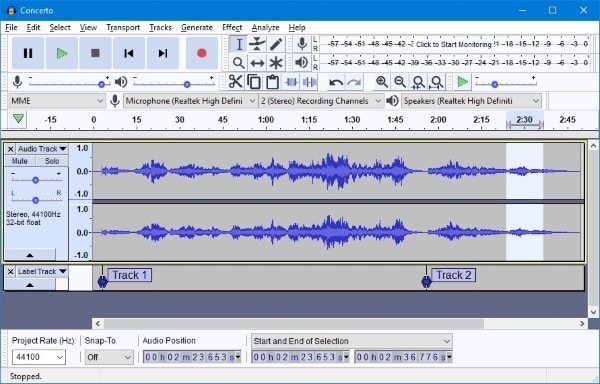
Key Features
- Introduce various types of noise and other sound effects to your audios.
- Preview and quick-play your audio clips easily.
- Merge or align tracks to the position of your choice.
- A range of supported formats includes MP3, WMA, WAV, AC3, OGG, and more.
- Simple keyboard shortcuts to make things easier.
2. WaveShop
WaveShop is yet another excellent open-source sound editor that can get the job done. It is a free and simple audio editor that is perfect for Windows users. WaveShop also comes in portable packages to suit your various needs. Do you wish to know more about it?
WaveShop offers many useful features for audio editing. You can import your audio files into the program’s interface and can then apply a range of functions. From trimming to amplifying and reversing audios, WaveShop lets you do it all. Go through its features to know more about it.
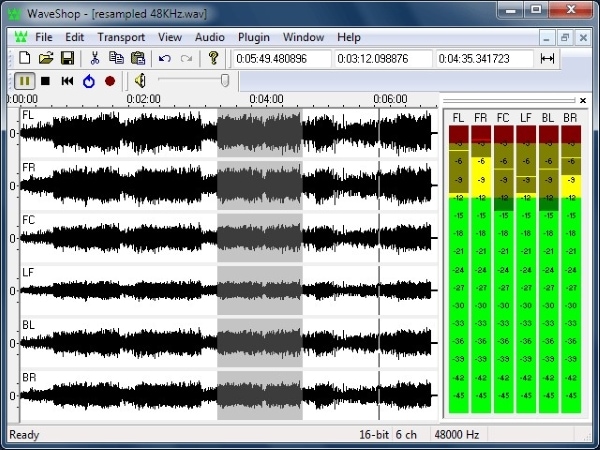
Key Features
- A multi-tab interface that enables you to edit different soundtracks in different windows.
- A timeline to easily delete, insert, or edit audio tracks.
- Audio effects and filters such as fade, reverse, amplify, etc.
- Save your output file in several formats such as RAW, WAV, AVR, FLAC, etc.
- A range of customization options like changing the sample size and waveform etc.
3. SoundEditor
The next open-source audio editor on our list is SoundEditor. Like other audio editors, SoundEditor comes with a range of editing options. These include cut/copy functions and recording soundtracks. The editor can also support multiple file editing in as many windows as you want. Isn’t it great?
Although SoundEditor comes with a full set of editing tools, it only supports WAV file formats. Still, the software is a good choice with its thorough toolset and easy-to-use functions. You can look across the key features to be sure about your selection.
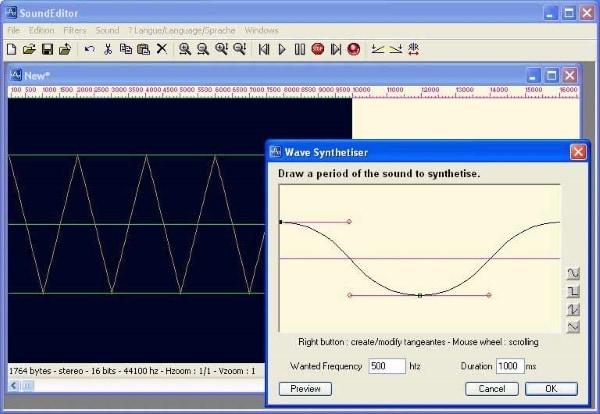
Key Features
- A built-in sound recorder in the software.
- Options to insert silence at specified lengths in the audio.
- Change the playback speed of the entire track or specific sections.
- Wave synthesizer and resampler options for audio files.
- A multiple documents interface to let you open many windows at once.
4. Ardour
Another splendid open-source sound editor specifically meant for Windows users is Ardour. Musicians, audio engineers, soundtrack editors, and composers worldwide trust Ardour. Ardour offers a set of comprehensive audio editing tools which can be used to make your audios shine. This is truly phenomenal!
Despite its unique features, Ardour is still pretty easy to use. Anyone with a basic idea about editing can use it to create audio masterpieces. From multichannel tracks to mixing and panning, Ardour has it all. Look across these features to know why it is among the best!
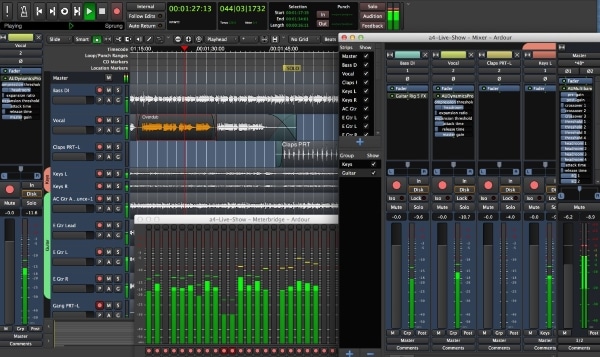
Key Features
- No limit to the number of tracks that can be edited simultaneously.
- Multichannel file export to save output files in different formats and sample rates.
- Flexible recording style without any setup requirement.
- Import videos and extract audio from them.
- Multiple routing and panning options along with sample-accurate automation.
5. Jokosher
Looking for a beginner-friendly tool? The answer lies in Jokosher. Jokosher is a simple and easy open-source audio editing software. As opposed to other complicated editors, Jokosher offers a plain and user-friendly interface. For people who do not have much experience in the field, Jokosher is the perfect fit.
You can use the tool to create powerful soundtracks for music, podcasts, and more. The timeline in Jokosher’s interface is relatively simple. You can achieve all basic aspects of audio editing, including audio mixing and splitting. Why is this option great? The features below say it all!
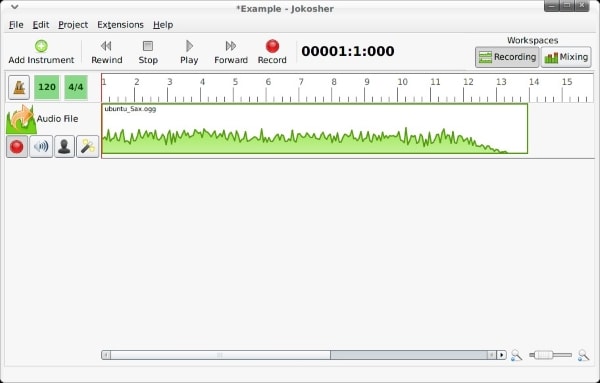
Key Features
- A simple and easy-to-use interface.
- Support for extended audio file formats including MP3, OGG, FLAC, WAV, etc.
- Multi-track overlayed audio mixing and editing support.
- Add instrumentals to your audios, including bass guitars, saxophone, trumpets, and more.
- An Extensions menu for extra features such as managing instruments and setting the tempo.
Conclusion
Finding the right tool for your every need is not always an easy task. But with the correct guidance, you can select the appropriate tool based on your needs.
The above-mentioned tools can make your audio files flourish in the best way possible. You can trim, merge, delete, or split audio files in a few simple clicks. You can also use these open-source sound editor tools to change playback speed and other properties. You can now put your creative abilities to good use. There’s so much that you can do!
If you wish to work with video files, your go-to video editor should undoubtedly be Wondershare Filmora . This one-of-a-kind editor allows you to make and edit quality video content in a stress-free way. Filmora is certainly every content creator’s first choice when it comes to top video editing software. You won’t be disappointed with the results!
For Win 7 or later (64-bit)
For macOS 10.12 or later
2. WaveShop
WaveShop is yet another excellent open-source sound editor that can get the job done. It is a free and simple audio editor that is perfect for Windows users. WaveShop also comes in portable packages to suit your various needs. Do you wish to know more about it?
WaveShop offers many useful features for audio editing. You can import your audio files into the program’s interface and can then apply a range of functions. From trimming to amplifying and reversing audios, WaveShop lets you do it all. Go through its features to know more about it.

Key Features
- A multi-tab interface that enables you to edit different soundtracks in different windows.
- A timeline to easily delete, insert, or edit audio tracks.
- Audio effects and filters such as fade, reverse, amplify, etc.
- Save your output file in several formats such as RAW, WAV, AVR, FLAC, etc.
- A range of customization options like changing the sample size and waveform etc.
3. SoundEditor
The next open-source audio editor on our list is SoundEditor. Like other audio editors, SoundEditor comes with a range of editing options. These include cut/copy functions and recording soundtracks. The editor can also support multiple file editing in as many windows as you want. Isn’t it great?
Although SoundEditor comes with a full set of editing tools, it only supports WAV file formats. Still, the software is a good choice with its thorough toolset and easy-to-use functions. You can look across the key features to be sure about your selection.

Key Features
- A built-in sound recorder in the software.
- Options to insert silence at specified lengths in the audio.
- Change the playback speed of the entire track or specific sections.
- Wave synthesizer and resampler options for audio files.
- A multiple documents interface to let you open many windows at once.
4. Ardour
Another splendid open-source sound editor specifically meant for Windows users is Ardour. Musicians, audio engineers, soundtrack editors, and composers worldwide trust Ardour. Ardour offers a set of comprehensive audio editing tools which can be used to make your audios shine. This is truly phenomenal!
Despite its unique features, Ardour is still pretty easy to use. Anyone with a basic idea about editing can use it to create audio masterpieces. From multichannel tracks to mixing and panning, Ardour has it all. Look across these features to know why it is among the best!

Key Features
- No limit to the number of tracks that can be edited simultaneously.
- Multichannel file export to save output files in different formats and sample rates.
- Flexible recording style without any setup requirement.
- Import videos and extract audio from them.
- Multiple routing and panning options along with sample-accurate automation.
5. Jokosher
Looking for a beginner-friendly tool? The answer lies in Jokosher. Jokosher is a simple and easy open-source audio editing software. As opposed to other complicated editors, Jokosher offers a plain and user-friendly interface. For people who do not have much experience in the field, Jokosher is the perfect fit.
You can use the tool to create powerful soundtracks for music, podcasts, and more. The timeline in Jokosher’s interface is relatively simple. You can achieve all basic aspects of audio editing, including audio mixing and splitting. Why is this option great? The features below say it all!

Key Features
- A simple and easy-to-use interface.
- Support for extended audio file formats including MP3, OGG, FLAC, WAV, etc.
- Multi-track overlayed audio mixing and editing support.
- Add instrumentals to your audios, including bass guitars, saxophone, trumpets, and more.
- An Extensions menu for extra features such as managing instruments and setting the tempo.
Conclusion
Finding the right tool for your every need is not always an easy task. But with the correct guidance, you can select the appropriate tool based on your needs.
The above-mentioned tools can make your audio files flourish in the best way possible. You can trim, merge, delete, or split audio files in a few simple clicks. You can also use these open-source sound editor tools to change playback speed and other properties. You can now put your creative abilities to good use. There’s so much that you can do!
If you wish to work with video files, your go-to video editor should undoubtedly be Wondershare Filmora . This one-of-a-kind editor allows you to make and edit quality video content in a stress-free way. Filmora is certainly every content creator’s first choice when it comes to top video editing software. You won’t be disappointed with the results!
For Win 7 or later (64-bit)
For macOS 10.12 or later
2. WaveShop
WaveShop is yet another excellent open-source sound editor that can get the job done. It is a free and simple audio editor that is perfect for Windows users. WaveShop also comes in portable packages to suit your various needs. Do you wish to know more about it?
WaveShop offers many useful features for audio editing. You can import your audio files into the program’s interface and can then apply a range of functions. From trimming to amplifying and reversing audios, WaveShop lets you do it all. Go through its features to know more about it.

Key Features
- A multi-tab interface that enables you to edit different soundtracks in different windows.
- A timeline to easily delete, insert, or edit audio tracks.
- Audio effects and filters such as fade, reverse, amplify, etc.
- Save your output file in several formats such as RAW, WAV, AVR, FLAC, etc.
- A range of customization options like changing the sample size and waveform etc.
3. SoundEditor
The next open-source audio editor on our list is SoundEditor. Like other audio editors, SoundEditor comes with a range of editing options. These include cut/copy functions and recording soundtracks. The editor can also support multiple file editing in as many windows as you want. Isn’t it great?
Although SoundEditor comes with a full set of editing tools, it only supports WAV file formats. Still, the software is a good choice with its thorough toolset and easy-to-use functions. You can look across the key features to be sure about your selection.

Key Features
- A built-in sound recorder in the software.
- Options to insert silence at specified lengths in the audio.
- Change the playback speed of the entire track or specific sections.
- Wave synthesizer and resampler options for audio files.
- A multiple documents interface to let you open many windows at once.
4. Ardour
Another splendid open-source sound editor specifically meant for Windows users is Ardour. Musicians, audio engineers, soundtrack editors, and composers worldwide trust Ardour. Ardour offers a set of comprehensive audio editing tools which can be used to make your audios shine. This is truly phenomenal!
Despite its unique features, Ardour is still pretty easy to use. Anyone with a basic idea about editing can use it to create audio masterpieces. From multichannel tracks to mixing and panning, Ardour has it all. Look across these features to know why it is among the best!

Key Features
- No limit to the number of tracks that can be edited simultaneously.
- Multichannel file export to save output files in different formats and sample rates.
- Flexible recording style without any setup requirement.
- Import videos and extract audio from them.
- Multiple routing and panning options along with sample-accurate automation.
5. Jokosher
Looking for a beginner-friendly tool? The answer lies in Jokosher. Jokosher is a simple and easy open-source audio editing software. As opposed to other complicated editors, Jokosher offers a plain and user-friendly interface. For people who do not have much experience in the field, Jokosher is the perfect fit.
You can use the tool to create powerful soundtracks for music, podcasts, and more. The timeline in Jokosher’s interface is relatively simple. You can achieve all basic aspects of audio editing, including audio mixing and splitting. Why is this option great? The features below say it all!

Key Features
- A simple and easy-to-use interface.
- Support for extended audio file formats including MP3, OGG, FLAC, WAV, etc.
- Multi-track overlayed audio mixing and editing support.
- Add instrumentals to your audios, including bass guitars, saxophone, trumpets, and more.
- An Extensions menu for extra features such as managing instruments and setting the tempo.
Conclusion
Finding the right tool for your every need is not always an easy task. But with the correct guidance, you can select the appropriate tool based on your needs.
The above-mentioned tools can make your audio files flourish in the best way possible. You can trim, merge, delete, or split audio files in a few simple clicks. You can also use these open-source sound editor tools to change playback speed and other properties. You can now put your creative abilities to good use. There’s so much that you can do!
If you wish to work with video files, your go-to video editor should undoubtedly be Wondershare Filmora . This one-of-a-kind editor allows you to make and edit quality video content in a stress-free way. Filmora is certainly every content creator’s first choice when it comes to top video editing software. You won’t be disappointed with the results!
For Win 7 or later (64-bit)
For macOS 10.12 or later
2. WaveShop
WaveShop is yet another excellent open-source sound editor that can get the job done. It is a free and simple audio editor that is perfect for Windows users. WaveShop also comes in portable packages to suit your various needs. Do you wish to know more about it?
WaveShop offers many useful features for audio editing. You can import your audio files into the program’s interface and can then apply a range of functions. From trimming to amplifying and reversing audios, WaveShop lets you do it all. Go through its features to know more about it.

Key Features
- A multi-tab interface that enables you to edit different soundtracks in different windows.
- A timeline to easily delete, insert, or edit audio tracks.
- Audio effects and filters such as fade, reverse, amplify, etc.
- Save your output file in several formats such as RAW, WAV, AVR, FLAC, etc.
- A range of customization options like changing the sample size and waveform etc.
3. SoundEditor
The next open-source audio editor on our list is SoundEditor. Like other audio editors, SoundEditor comes with a range of editing options. These include cut/copy functions and recording soundtracks. The editor can also support multiple file editing in as many windows as you want. Isn’t it great?
Although SoundEditor comes with a full set of editing tools, it only supports WAV file formats. Still, the software is a good choice with its thorough toolset and easy-to-use functions. You can look across the key features to be sure about your selection.

Key Features
- A built-in sound recorder in the software.
- Options to insert silence at specified lengths in the audio.
- Change the playback speed of the entire track or specific sections.
- Wave synthesizer and resampler options for audio files.
- A multiple documents interface to let you open many windows at once.
4. Ardour
Another splendid open-source sound editor specifically meant for Windows users is Ardour. Musicians, audio engineers, soundtrack editors, and composers worldwide trust Ardour. Ardour offers a set of comprehensive audio editing tools which can be used to make your audios shine. This is truly phenomenal!
Despite its unique features, Ardour is still pretty easy to use. Anyone with a basic idea about editing can use it to create audio masterpieces. From multichannel tracks to mixing and panning, Ardour has it all. Look across these features to know why it is among the best!

Key Features
- No limit to the number of tracks that can be edited simultaneously.
- Multichannel file export to save output files in different formats and sample rates.
- Flexible recording style without any setup requirement.
- Import videos and extract audio from them.
- Multiple routing and panning options along with sample-accurate automation.
5. Jokosher
Looking for a beginner-friendly tool? The answer lies in Jokosher. Jokosher is a simple and easy open-source audio editing software. As opposed to other complicated editors, Jokosher offers a plain and user-friendly interface. For people who do not have much experience in the field, Jokosher is the perfect fit.
You can use the tool to create powerful soundtracks for music, podcasts, and more. The timeline in Jokosher’s interface is relatively simple. You can achieve all basic aspects of audio editing, including audio mixing and splitting. Why is this option great? The features below say it all!

Key Features
- A simple and easy-to-use interface.
- Support for extended audio file formats including MP3, OGG, FLAC, WAV, etc.
- Multi-track overlayed audio mixing and editing support.
- Add instrumentals to your audios, including bass guitars, saxophone, trumpets, and more.
- An Extensions menu for extra features such as managing instruments and setting the tempo.
Conclusion
Finding the right tool for your every need is not always an easy task. But with the correct guidance, you can select the appropriate tool based on your needs.
The above-mentioned tools can make your audio files flourish in the best way possible. You can trim, merge, delete, or split audio files in a few simple clicks. You can also use these open-source sound editor tools to change playback speed and other properties. You can now put your creative abilities to good use. There’s so much that you can do!
If you wish to work with video files, your go-to video editor should undoubtedly be Wondershare Filmora . This one-of-a-kind editor allows you to make and edit quality video content in a stress-free way. Filmora is certainly every content creator’s first choice when it comes to top video editing software. You won’t be disappointed with the results!
For Win 7 or later (64-bit)
For macOS 10.12 or later
Illuminating Soundscapes with Imagery: Techniques for Photographic Audio Amalgamation [2023 Art & Technology Insights]
How to Add Photos to Audio

Shanoon Cox
Mar 27, 2024• Proven solutions
Want to add photos to audio so that you can upload it to YouTube? Or want to turn your photo albums into a stunning slideshow? You can do it quickly in the video editing software like Wondershare Filmora (originally Wondershare Video Editor) . This powerful tool will help you easily make a creative creation on your own. Follow the simple five-step instructions below to learn how to add photos to audio with just three simple steps.
Simply free download filmora video editor if you don’t have it yet.
 Download Mac Version ](https://tools.techidaily.com/wondershare/filmora/download/ )
Download Mac Version ](https://tools.techidaily.com/wondershare/filmora/download/ )
How to add photos to audio step by step guide
1Import your photo and audio files
Install and run Video Editor. Choose from “16:9” or “4:3” ratio rate. Then click the “Import” button to import your photo and audio files. You can also directly drag and drop the files to the program.
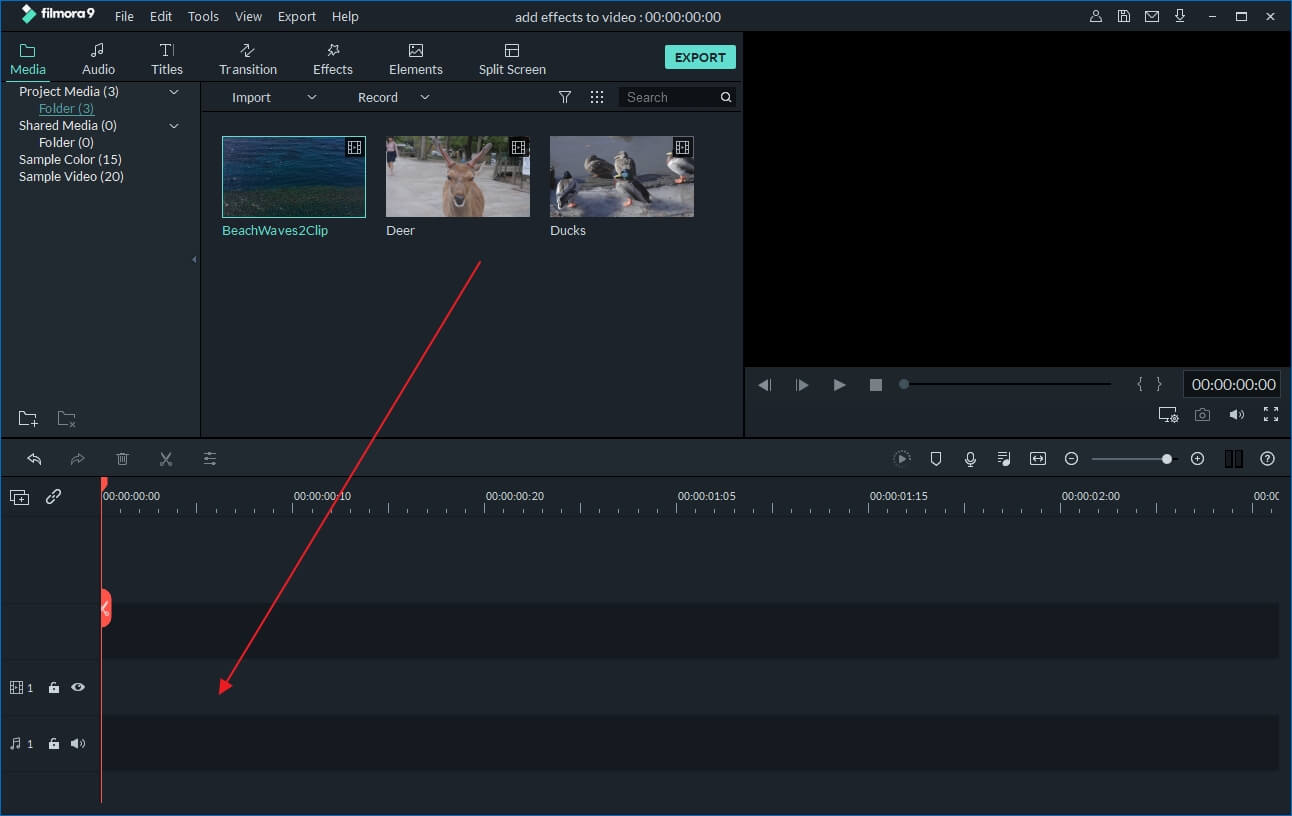
2Add photos to audio and rearrange them
Then select these added files and move them to the corresponding tracks on the timeline panel below. The photos should be placed on the video track and the audio file on the music track. Then put the photos in the order you want them to appear in your creation. After that, adjust timing by highlighting and target file and moving the red slider.
Besides that, you can also improve the quality of your photos and even apply special effects to them. To review the list of available filters and effects, click the “Effects” button in the tool bar to display the menu. Here is a detailed guide about how to apply effects to video.
If the audio file needs editing, double click it and adjust the volume and pitch or add fade in or fade out effect in the pop up window.
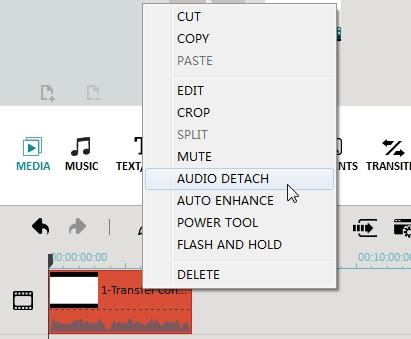
3Share or save our own creation
After adding photos to audio, you can save the creation in different ways. In the “Format” tab, you can save the file in any popular media format. If you want the file be played on mobile devices, go to the “Device” tab and choose one of the devices from the list.
Of course, publish it in social media like Facebook and YouTube is also another good choice if you want to share the video with your friend. To do this, click the “Create” button and go to the “YouTube” tab. Fill in the information and this program will publish your creation to the social media pages - it will be uploaded promptly and properly. You can also burn a DVD and present your family or friends with a beautifully packaged disk.

 Download Mac Version ](https://tools.techidaily.com/wondershare/filmora/download/ )
Download Mac Version ](https://tools.techidaily.com/wondershare/filmora/download/ )

Shanoon Cox
Shanoon Cox is a writer and a lover of all things video.
Follow @Shanoon Cox
Shanoon Cox
Mar 27, 2024• Proven solutions
Want to add photos to audio so that you can upload it to YouTube? Or want to turn your photo albums into a stunning slideshow? You can do it quickly in the video editing software like Wondershare Filmora (originally Wondershare Video Editor) . This powerful tool will help you easily make a creative creation on your own. Follow the simple five-step instructions below to learn how to add photos to audio with just three simple steps.
Simply free download filmora video editor if you don’t have it yet.
 Download Mac Version ](https://tools.techidaily.com/wondershare/filmora/download/ )
Download Mac Version ](https://tools.techidaily.com/wondershare/filmora/download/ )
How to add photos to audio step by step guide
1Import your photo and audio files
Install and run Video Editor. Choose from “16:9” or “4:3” ratio rate. Then click the “Import” button to import your photo and audio files. You can also directly drag and drop the files to the program.

2Add photos to audio and rearrange them
Then select these added files and move them to the corresponding tracks on the timeline panel below. The photos should be placed on the video track and the audio file on the music track. Then put the photos in the order you want them to appear in your creation. After that, adjust timing by highlighting and target file and moving the red slider.
Besides that, you can also improve the quality of your photos and even apply special effects to them. To review the list of available filters and effects, click the “Effects” button in the tool bar to display the menu. Here is a detailed guide about how to apply effects to video.
If the audio file needs editing, double click it and adjust the volume and pitch or add fade in or fade out effect in the pop up window.

3Share or save our own creation
After adding photos to audio, you can save the creation in different ways. In the “Format” tab, you can save the file in any popular media format. If you want the file be played on mobile devices, go to the “Device” tab and choose one of the devices from the list.
Of course, publish it in social media like Facebook and YouTube is also another good choice if you want to share the video with your friend. To do this, click the “Create” button and go to the “YouTube” tab. Fill in the information and this program will publish your creation to the social media pages - it will be uploaded promptly and properly. You can also burn a DVD and present your family or friends with a beautifully packaged disk.

 Download Mac Version ](https://tools.techidaily.com/wondershare/filmora/download/ )
Download Mac Version ](https://tools.techidaily.com/wondershare/filmora/download/ )

Shanoon Cox
Shanoon Cox is a writer and a lover of all things video.
Follow @Shanoon Cox
Shanoon Cox
Mar 27, 2024• Proven solutions
Want to add photos to audio so that you can upload it to YouTube? Or want to turn your photo albums into a stunning slideshow? You can do it quickly in the video editing software like Wondershare Filmora (originally Wondershare Video Editor) . This powerful tool will help you easily make a creative creation on your own. Follow the simple five-step instructions below to learn how to add photos to audio with just three simple steps.
Simply free download filmora video editor if you don’t have it yet.
 Download Mac Version ](https://tools.techidaily.com/wondershare/filmora/download/ )
Download Mac Version ](https://tools.techidaily.com/wondershare/filmora/download/ )
How to add photos to audio step by step guide
1Import your photo and audio files
Install and run Video Editor. Choose from “16:9” or “4:3” ratio rate. Then click the “Import” button to import your photo and audio files. You can also directly drag and drop the files to the program.

2Add photos to audio and rearrange them
Then select these added files and move them to the corresponding tracks on the timeline panel below. The photos should be placed on the video track and the audio file on the music track. Then put the photos in the order you want them to appear in your creation. After that, adjust timing by highlighting and target file and moving the red slider.
Besides that, you can also improve the quality of your photos and even apply special effects to them. To review the list of available filters and effects, click the “Effects” button in the tool bar to display the menu. Here is a detailed guide about how to apply effects to video.
If the audio file needs editing, double click it and adjust the volume and pitch or add fade in or fade out effect in the pop up window.

3Share or save our own creation
After adding photos to audio, you can save the creation in different ways. In the “Format” tab, you can save the file in any popular media format. If you want the file be played on mobile devices, go to the “Device” tab and choose one of the devices from the list.
Of course, publish it in social media like Facebook and YouTube is also another good choice if you want to share the video with your friend. To do this, click the “Create” button and go to the “YouTube” tab. Fill in the information and this program will publish your creation to the social media pages - it will be uploaded promptly and properly. You can also burn a DVD and present your family or friends with a beautifully packaged disk.

 Download Mac Version ](https://tools.techidaily.com/wondershare/filmora/download/ )
Download Mac Version ](https://tools.techidaily.com/wondershare/filmora/download/ )

Shanoon Cox
Shanoon Cox is a writer and a lover of all things video.
Follow @Shanoon Cox
Shanoon Cox
Mar 27, 2024• Proven solutions
Want to add photos to audio so that you can upload it to YouTube? Or want to turn your photo albums into a stunning slideshow? You can do it quickly in the video editing software like Wondershare Filmora (originally Wondershare Video Editor) . This powerful tool will help you easily make a creative creation on your own. Follow the simple five-step instructions below to learn how to add photos to audio with just three simple steps.
Simply free download filmora video editor if you don’t have it yet.
 Download Mac Version ](https://tools.techidaily.com/wondershare/filmora/download/ )
Download Mac Version ](https://tools.techidaily.com/wondershare/filmora/download/ )
How to add photos to audio step by step guide
1Import your photo and audio files
Install and run Video Editor. Choose from “16:9” or “4:3” ratio rate. Then click the “Import” button to import your photo and audio files. You can also directly drag and drop the files to the program.

2Add photos to audio and rearrange them
Then select these added files and move them to the corresponding tracks on the timeline panel below. The photos should be placed on the video track and the audio file on the music track. Then put the photos in the order you want them to appear in your creation. After that, adjust timing by highlighting and target file and moving the red slider.
Besides that, you can also improve the quality of your photos and even apply special effects to them. To review the list of available filters and effects, click the “Effects” button in the tool bar to display the menu. Here is a detailed guide about how to apply effects to video.
If the audio file needs editing, double click it and adjust the volume and pitch or add fade in or fade out effect in the pop up window.

3Share or save our own creation
After adding photos to audio, you can save the creation in different ways. In the “Format” tab, you can save the file in any popular media format. If you want the file be played on mobile devices, go to the “Device” tab and choose one of the devices from the list.
Of course, publish it in social media like Facebook and YouTube is also another good choice if you want to share the video with your friend. To do this, click the “Create” button and go to the “YouTube” tab. Fill in the information and this program will publish your creation to the social media pages - it will be uploaded promptly and properly. You can also burn a DVD and present your family or friends with a beautifully packaged disk.

 Download Mac Version ](https://tools.techidaily.com/wondershare/filmora/download/ )
Download Mac Version ](https://tools.techidaily.com/wondershare/filmora/download/ )

Shanoon Cox
Shanoon Cox is a writer and a lover of all things video.
Follow @Shanoon Cox
Also read:
- [New] 2024 Approved Step-by-Step Guide to Creating Breathtaking Tile Art
- [New] Instagram's Visual Spectacle Becoming a Reel Wizard
- [Updated] The Formula for Fast-Tracking to a Thousand Subscribers for 2024
- 2024 Approved Prime Streaming Platforms for Authors
- Compact Computer with Full AMD Ryzen Setup: Foldable Mini Keyboard & Touchpad, Just Needs a Screen!
- Enhancing Digital Marketing with Advanced Cookiebot Technology
- In 2024, Pokémon Go Cooldown Chart On Vivo S17 Pro | Dr.fone
- Navigating the Fixes: Addressing Common Corsair iCUE Malfunctions in Windows 11 Environments
- Top-Rated Support Center - Grossing a 245/100 Score
- Ultimate Lens Selection Tips for Vloggers & Editors
- Updated In 2024, The Essential Directory of Fee-Free, High-Quality Audio Player Applications for Android and iOS Devices
- Updated In 2024, Your First Steps in Podcast Editing A Comprehensive Beginners Guide
- Updated Integrating Sound Into iMovie Projects For Complete Novices for 2024
- Updated The Modern Producers Choice Ranking the Best 8 Music Production Software for Mac/Windows
- Updated Top 10 Audio Reversal Tools Latest Edition for PCs & Mobile Devices for 2024
- Voice Memos Unveiled Comparing Features and Options Beyond Vocaroo for 2024
- Title: Updated From Sight to Sound Modern Methods for Pulling Audio From Visual Media for 2024
- Author: Kate
- Created at : 2024-10-11 21:51:01
- Updated at : 2024-10-17 17:58:39
- Link: https://audio-editing.techidaily.com/updated-from-sight-to-sound-modern-methods-for-pulling-audio-from-visual-media-for-2024/
- License: This work is licensed under CC BY-NC-SA 4.0.
